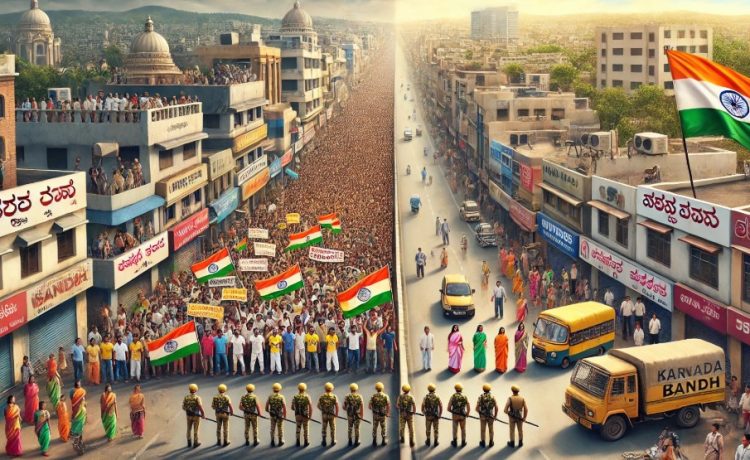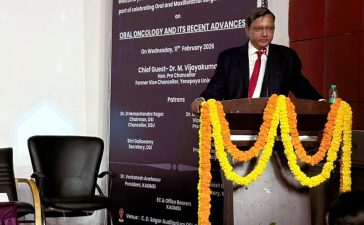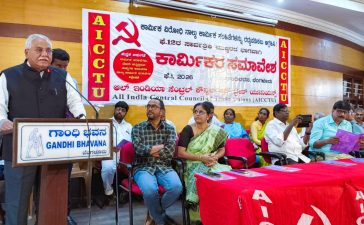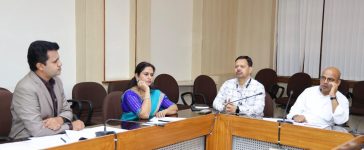Karnataka Bandh: Mixed Response Across State Amid Government’s Assurance of Law and Order
Bengaluru, March 22, 2025 – A 12-hour statewide bandh, called by pro-Kannada organizations to protest the alleged assault on a Karnataka State Road Transport Corporation (KSRTC) bus conductor in Belagavi for not speaking Marathi, elicited a mixed response across Karnataka today. While certain areas witnessed protests and demonstrations, daily activities in many parts of the state continued as usual.
Government’s Stance and Law Enforcement Measures
Home Minister G. Parameshwara assured the public that the government had taken all necessary measures to maintain law and order during the bandh. He stated that police forces across the state were put on high alert to prevent any untoward incidents. Special instructions were given to district police commissioners and superintendents to closely monitor the situation.
“The bandh has not been widespread. Most of the state is functioning as usual, and we are ensuring that no law and order issues arise,” said the Home Minister. He further added that strict action would be taken against anyone attempting to disrupt public life.
The government emphasized that while it respects democratic protests, it would not tolerate any acts of violence or forced shutdowns.
Limited Impact on Daily Life
Despite the call for a bandh, normal life remained largely unaffected in many parts of Karnataka. Essential services, including hospitals, pharmacies, and grocery stores, remained open. While some small businesses and shops voluntarily shut down in support of the bandh, major commercial establishments operated as usual.
Public transport services were mostly unaffected. BMTC and KSRTC buses continued running, and Namma Metro services in Bengaluru operated without disruption. However, as a precautionary measure, Maharashtra State Road Transport Corporation (MSRTC) buses were halted at the Karnataka-Maharashtra border to avoid potential conflicts.
Restaurants and hotels remained open, as major hospitality associations did not extend their support to the bandh. The city’s main markets, including K.R. Market and Majestic, remained active, allowing residents to go about their daily routines.
Protests and Demonstrations
 Pro-Kannada activists staged protests in various districts, particularly in Bengaluru, Belagavi, and Mysuru. In Bengaluru, protestors, led by Kannada activist Vatal Nagaraj, marched from Town Hall to Freedom Park, raising slogans against linguistic discrimination. The protests remained largely peaceful, with a strong police presence ensuring that no violence broke out.
Pro-Kannada activists staged protests in various districts, particularly in Bengaluru, Belagavi, and Mysuru. In Bengaluru, protestors, led by Kannada activist Vatal Nagaraj, marched from Town Hall to Freedom Park, raising slogans against linguistic discrimination. The protests remained largely peaceful, with a strong police presence ensuring that no violence broke out.
To maintain law and order, police detained several protestors attempting to enforce the bandh forcibly in certain areas. Authorities confirmed that all detentions were preventive and aimed at ensuring public safety.
Vatal Nagaraj and other protest leaders vowed to continue their agitation against linguistic discrimination and demanded stronger protections for Kannada-speaking citizens across Karnataka.
Public Reaction to the Bandh
The bandh received mixed reactions from the general public. While many supported the cause and believed that such protests were necessary to protect Kannada identity, others felt that frequent shutdowns disrupt daily life and economic activities.
Office-goers, students, and daily wage workers expressed concerns about the impact of repeated bandhs on productivity and livelihoods. “While I support the demand for justice, shutting down the entire state affects people who rely on daily earnings,” said a shop owner in Bengaluru.
At the same time, several citizens highlighted the importance of standing against any form of linguistic discrimination, stating that the government should take stronger measures to protect Kannada speakers in border areas like Belagavi.
Conclusion
The Karnataka bandh on March 22, 2025, demonstrated the state’s ability to uphold democratic rights while maintaining public order. With limited disruptions to essential services and a well-prepared law enforcement response, the bandh did not significantly impact the daily lives of most citizens.
The event also reignited debates on linguistic identity, governance, and the role of protests in addressing social issues. While the bandh served as a strong statement from pro-Kannada organizations, it also raised questions about alternative ways to voice demands without affecting public life.
As the situation unfolds, all eyes remain on the government’s next steps in addressing the concerns raised by protestors while ensuring that Karnataka remains peaceful and inclusive for all its residents.
Statements & Quotes
-
“The bandh received mixed reactions—while some businesses closed in support, many others continued operations as usual.”
-
“We are protesting peacefully to safeguard Kannada identity, but we expect the government to take stronger measures.” – Protestor in Bengaluru
-
“We respect the right to protest, but repeated bandhs disrupt livelihoods and daily activities.” – Local shop owner
-
“Law and order is our priority. Preventive measures have been taken to ensure no untoward incidents occur.” – Karnataka Home Minister G. Parameshwara
-
“Karnataka Bandh has once again highlighted the linguistic and cultural issues in border areas like Belagavi.”
Q&A
Q: Why was the Karnataka Bandh called?
A: The bandh was organized by pro-Kannada groups in response to an alleged assault on a KSRTC bus conductor in Belagavi for not speaking Marathi.
Q: How did the government respond?
A: The state government assured strict law enforcement, stating that public safety would not be compromised. Police were deployed across major cities, and protests were monitored closely.
Q: Did the bandh have a significant impact?
A: The response was mixed. While some businesses and transport services operated normally, protests and roadblocks occurred in certain areas, especially in Bengaluru, Mysuru, and Belagavi.
Q: How did the general public react?
A: Reactions were divided—some supported the bandh to express solidarity, while others continued their daily activities, emphasizing the need for non-disruptive protests.
Context & Background
The Karnataka Bandh was organized by pro-Kannada activists following an incident in Belagavi where a KSRTC bus conductor was allegedly assaulted for not speaking Marathi. The bandh aimed to protest linguistic discrimination and demand stronger protections for Kannada speakers, particularly in border areas. While the bandh saw participation in select locations, overall, normal life was largely unaffected, with public transport, businesses, and essential services functioning as usual. The government assured that necessary precautions were in place to prevent any escalation of tensions.
#KarnatakaBandh #ProKannadaProtest #Bengaluru #KannadaIdentity #LawAndOrder #PublicResponse #BandhImpact #KarnatakaPolitics
![]()











